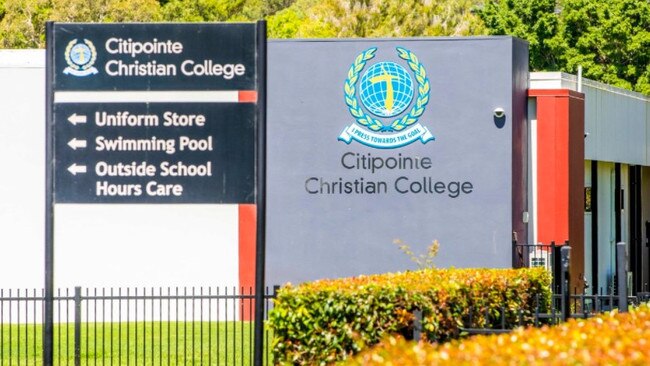Qld parents slam new anti-discrimination laws to protect religiously diverse school staff
New anti-discrimination laws to protect religiously diverse school staff are “dangerously authoritarian” and could pave the way for a ban on bibles a Queensland parent and school employee says.
Southeast
Don't miss out on the headlines from Southeast. Followed categories will be added to My News.
Thousands of Queensland parents have been left outraged over new proposed laws which could prevent Christian schools from discriminating against employees who do not share their religious beliefs.
The controversial change to the state’s 30-year-old Anti-Discrimination Act is one of 46 recently recommended by Human Rights Commissioner Scott McDougall to “reflect the aspirations and needs of contemporary society”.
If adopted, discrimination on the grounds of religion will only be acceptable against people who teach, or are involved with the observance or practice, of a particular religion.
It would therefore be discriminatory for a school not to hire people such as science teachers or groundskeepers because their religious beliefs do not align with its own.

The proposed changes have sparked fury in parents across the state, with one petition created this month in opposition of the legislation attracting more than 4700 signatures in a matter of days.
“Recommendation 39 of the (commission’s) report removes the ability of religious schools to exclusively hire staff who profess faith consistent with the school’s tenets, beliefs and values,” petition organiser Andrew Iles wrote.
“Parents who choose to enrol their children in a Christian school expect all staff within a Christian school to share the beliefs of the school regardless of whether they are the science teacher, the music teacher, et cetera.”
Mr Iles, an employee at a Christian school in Bundaberg, described the proposed changes as “an attack on the rights of parents in Queensland to educate their children in a school that upholds Christian values and beliefs”.
A second petition by Lawnton man Bruce Vaschina, which has now been signed by more than 500 people, raised concerns about employees who do not share their schools’ religious beliefs leading form classes in which they discuss “moral topics”.
“It is a dangerously authoritarian approach to dismiss the idea of allowing religious schools to require employees to adhere to a publicly available statement of beliefs and practices, on the basis that issuing such statements is ‘contrary to a primary aim of discrimination law’,” Mr Vaschina wrote.
“Such an encroachment upon freedom of expression has wider ramifications that ought not to be tolerated in a free society.”

As a school employee and father-of-four, Mr Vaschina said he was deeply concerned about the wide-ranging repercussions a legislative change, such as that proposed in Recommendation 39 of the report, might have.
“The (commission’s) report implied that setting out a publicly available list of stated requirements for staff which might include things like believing and practising that sexual relations are only appropriate between an adult male and an adult female in the context of a legally recognised commitment to exclusivity and ideally, permanence — i.e. traditional marriage — violates one of the principles of the anti-discrimination act,” he said.
“As the petition says, I believe this is dangerously authoritarian territory — the next thing will be to ban Bibles, as the teaching (about traditional marriage) comes straight from there and, for Christian schools, that is the reason they believe it and want to state it.
“It is an unacceptable overreach on the part of government to be on this pathway.”
He said no parent was being forced to send their child or children to a school that operates under religious ideas and both disagreeing parents and staff could, quite easily, find another school better suited to them and their beliefs.
Following a controversial move by a Brisbane school to ask families to sign contracts denouncing homosexuality, the commission also recommended discrimination on the grounds of sex or religion against existing students be outlawed.




